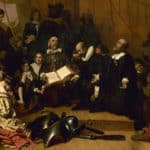Tenth Amendment Center: The Pilgrim Code of Law: One of Many Sources of Our American Constitution

One of the more ludicrous claims about the Constitution is that fifty-five old white rich men just sort of “made it up.” There are two versions of this claim: One that it was put together out of whole cloth to serve their interests, and the other that it was revealed in a flash of divine light.
This claim has been disseminated by people who should know better. For example, in 1972 a Montana state commission authored, and Montana State University published, a pamphlet to “educate” citizens and convention delegates about the supposed need for a new state constitution. To convince the reader to adopt the authors’ principles instead, the pamphlet asserted that “When the Founding Fathers of the United States . . . desired to write their ideas about government on paper, they found few guidelines.”
In fact, the Constitution was the product of centuries of “guidelines.” In addition to classical writings on the subject, including those by Aristotle and Cicero, there was a long chain of Anglo-American foundational documents beginning with medieval charters, including, but not limited to, Magna Carta. They also included various European practices, the English Petition of Right of (1628), two constitutions from the time of Oliver Cromwell, the English Bill (or Declaration) of Rights of 1689, colonial charters, instructions to colonial governors, and a multitude of American documents from both the colonial and post-Independence era.
With the approach of Thanksgiving, it seems appropriate to mention the following: Among the colonial documents serving as a source of guidelines was the Pilgrim Code of Law of 1636, which political science Professor Donald S. Lutz describes as “a candidate for the honor of being the first true written constitution in the modern world” (using the word “constitution” in the sense Americans now use it). The document began by creating what we would call a “law revision commission.” It then went on to—
* specify that no laws would be adopted other than by the consent of the community,
* set an annual election day and provide for the annual election of a governor and seven “assistants,” who formed an executive council,
* grant the governor the executive power,
* provide for other annually-elected officers, including a provincial treasurer, clerk, and coroner,
* specify oaths for officers and freemen,
* require that laws be made and taxes levied only by the freemen of the province,
* provide for trial by jury, and
* empower panels consisting of the governor and any two assistants to try minor cases.
You can find the Pilgrim Code of Laws, and Professor Lutz’s comments on it, here.
Rob Natelson
October 23, 2018 at 02:11PM
